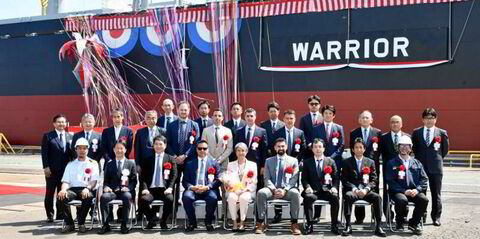Sam Ka, president and chief operating officer, ship/offshore marketing division, Hyundai Heavy Industries:
“The number of new deliveries from shipyards will fall from the second half of this year and up to 2018,” said Sam Ka. “Introduction of new regulations can also advance the potential phase-out of superannuated ships.”
Ka believes newbuilding demand will be another challenging year for shipyards as the global economy remains uncertain. But, the market may bottom out from the second half of this year, followed by a steady recovery.
“We anticipate across the board potential for replacement demand after a prolonged pause of new investment, although the magnitude appears to be not fully-fledged yet. LNG ships continue to draw our attention,” said Ka.
LNG FSRU are expected to be in demand as an alternative power source, while small scale LNG carriers (including bunker vessels) may increase slowly. Consensus among oil exporting countries is likely to boost the price of oil, which may revive new investment for offshore-related production and transport business.
“The Korean shipbuilding industry has already gone through a tough and painful restructuring process, sacrificing considerable human resources and construction facilities. It will become more competitive and better poised to respond to the challenging market requirements,” he concluded.
Ka says the newbuilding oversupply situation will improve because orders tapered off from mid-2015.
Gerry Northwood, COO of MAST, the international maritime risk management company, and former Royal Navy counter piracy commander:
“West Africa is probably the region that frustrates the commercial shipping industry the most. Ongoing corruption issues in Nigeria are preventing sustainable anti-piracy measures being put in place. Expect more of the same in 2017 - sporadic incidents of kidnap and perhaps a return to product theft if the Nigerian Navy fails to keep the pressure on.
“Despite recent kidnappings in the Sulu Sea, the Far East is less threatening to seafarers than hitherto.Regional governments have taken successful action to reduce criminality and acting together, it is likely that they will be able to mitigate the Abu Sayyef threat.
“Counter-piracy in the Indian Ocean is generally well managed but the trends are moving in the wrong direction. NATO withdrawal, stalled Somali elections and no end in sight to the Yemeni civil war are adding to the uncertainty. A recent pirate attack demonstrates intent and terrorism in the southern Red Sea has added another layer of complexity to security in the region”.
Lex Nijsen, vice-president and head of Four-Stroke Marine, MAN Diesel & Turbo
“The market situation for the four-stroke marine business in 2015 was already quite tough and saw the market decline sharply by almost half. And nothing has really improved this year; the market segments where we are traditionally strong are under pressure.
Owing to the low oil price, there is a complete dearth of investment throughout the offshore industry. Take exploration and production, for example: there are currently no exploration vessels on order or being planned. That is quite simply down to a very low oil price.”
Asked how this is affecting business, Nijsen said: “Our sales team has to focus on every project on an individual basis. Consequently, it isn’t just the technical solutions we can offer that are the key factor for an owner or a yard when making decisions; price is now becoming increasingly important too. So we have to be very careful with our costs to keep our prices in line with the market.”
But “there is always light at the end of the tunnel”, he said. “One of the effects we are experiencing with the low oil price is that ferry operators are investing again. Cheap oil means the fuel costs for operating their ships are low — but their ticket prices never dropped and therefore they are making money and can invest in new vessels.
“Other industries, like the leisure business [cruise], are still very active, although the delivery of these ships begins from 2020 onwards. But those decisions have to be taken in advance. With new environmental rules coming into force, a new generation of ships will come on order; for example, hybrid and gas-fuelled ships.”


